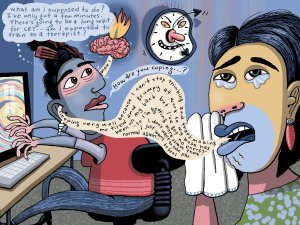A range of approaches is needed to manage mental health presentations. In this article, specialist GP Sophie Jadwiga Ball describes two tools that can be employed within a GP consultation and provides the evidence-based theory behind their use. She also presents numerous examples to demonstrate how you can apply these tools in practice
Music-based therapeutic interventions help depression in dementia
Vault Navigation
Music-based therapeutic interventions help depression in dementia
How effective are music-based therapeutic interventions for people with dementia on emotional wellbeing, including quality of life, mood disturbance or negative affect, behavioural problems, social behaviour and cognition, at the end of therapy and 4 or more weeks after the end of treatment?
Providing people with dementia with at least 5 sessions of a music-based therapeutic intervention reduced depressive symptoms but had little or no effect on agitation or aggression. There was also little or no effect on emotional wellbeing or quality of life, overall behavioural problems and cognition. There was uncertainty about effects on anxiety or social behaviour, and about any long-term effects. It was not clear whether effects would persist beyond the intervention period and music-based interventions may need to be continued for prolonged periods for a sustained effect. All the participants were living in care homes, and all severities of dementia were included.
The quality of the trials and how well they were reported varied. The quality of the evidence on anxiety and social behaviour, and for all long-term outcomes, was very low.
In the later stages of dementia, it may be difficult for people to communicate with words, but even when they can no longer speak they may still be able to hum or play along with music. Therapy involving music may, therefore, be especially suitable for people with dementia.
Van der Steen JT et al. Music-based therapeutic interventions for people with dementia. Cochrane Reviews, 2017, Issue 5. Art. No.: CD003477.DOI: 10.1002/14651858. CD003477.pub3. This review contains 17 studies involving 680 participants.




